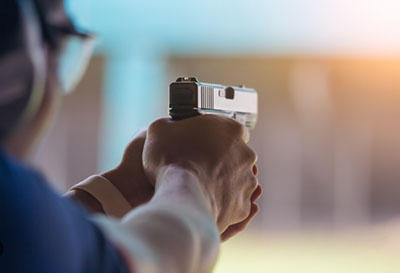by WorldTribune Staff, October 29, 2023
Israel has a citizens’ army. It does not have an armed citizenry.
Only two percent of Israel’s population are legal gun owners. In the United States, it’s 30 percent.

“While Israel is no stranger to terrorism, calls for more guns have failed to garner widespread public support,” JNS.org’s David Isaac wrote in an Oct. 29 analysis.
“The scale and savagery of Hamas’s attack changed that.”
Since the Oct. 7 attack, a Knesset command center was set up to handle the flood of firearm applications.
“There are now over 120,000 requests for the Firearms Division. Please be patient and the division representatives will get back to everyone,” Israeli National Security Minister Itamar Ben-Gvir tweeted last week.
In an address to the nation, Israeli Prime Minister Benjamin Netanyahu said the Jewish State is “encouraging citizens, and helping citizens, to arm themselves with personal weapons for defense.”
“Before this disaster, people in Israel didn’t really understand why they needed personal weapons,” Raz Blizovsky, who founded The Project for Civil Security in the wake of the Hamas attack, told JNS. “Now, after what happened in the Gaza Strip, people understand.”
Israel’s National Security Committee on Oct. 16 approved regulations expanding the criteria for citizens to obtain a gun license. Previously, the two main criteria were military service and “place of residence” (whether a citizen lives in what is considered a dangerous area). Both criteria, along with lesser ones affecting fewer people, have been redefined to allow more citizens to qualify.
Josh Plank, a father of eight who resides in Katzrin, told JNS that he hadn’t applied for a gun license before because he found the process daunting.
Plank, who moved to Israel from the United States, said he has been familiar with firearms since childhood. When he lived in Phoenix, he once held a home invader at gunpoint for nearly an hour until police arrived.
“I cornered him in the laundry room just inches from my baby daughter’s crib,” he said. “Whatever he had planned, he gave it up pretty quickly, accepted the situation, and asked if he could at least have a smoke. The answer was no.”
“I originally hail from Indiana. Having a gun wasn’t a big deal. Trying to get one here is a nightmare. Whoever heard of going through such hoops for a peashooter,” said Plank, who in the U.S. said he preferred a .45 Colt revolver to the more popular 9 millimeter semi-automatics.
“The system’s designed to keep you from protecting your family, not to mention your neighborhood. It’s the very opposite of the American attitude. Here, they force you to rely on the government. And the fact is it can’t always be relied upon. Just look at what happened down by Gaza.”
Plank says he would never consider returning to the United States. “We may be surrounded by heavily armed savages who would love to massacre every one of us, but the people of Israel have a God. I guess I like those odds,” he said.
Israeli media, which up until the Oct. 7 attack had reported on gun rights much the way U.S. leftist media does, gave a detailed account of a member of an elite police unit who managed, with nothing by a Glock handgun, to fend off Hamas terrorists armed with automatic machine guns and rocket-propelled grenades. The estimated that he killed 10 to 14 terrorists while saving himself, his wife, and their child.
Isaac noted: “Prominently displayed in the foreground during the interview was his pistol. The pro-gun message, so unusual for a mainstream Israeli station, was impossible to miss — that even a small firearm can be the difference between life and death, even against seemingly impossible odds.”
David Isaac also servers on the Advisory Board of Free Press Foundation.
